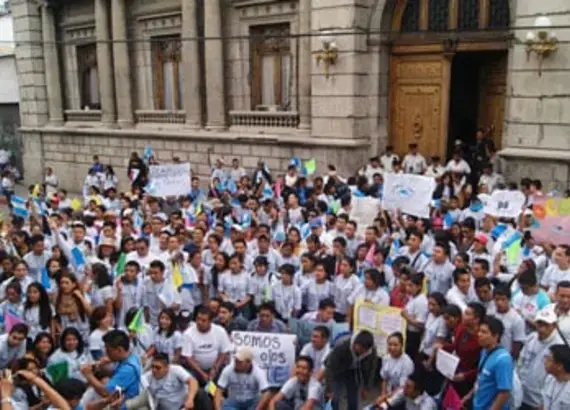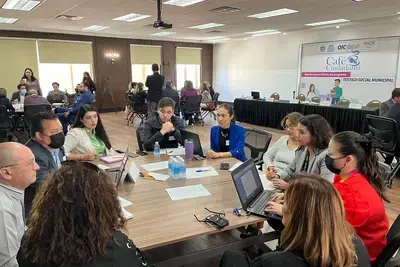
Citizen observers participate in a rally against corruption and impunity in government
Success Story
NDI and Partners Publish Analyses on Political Developments in Guatemala
Guatemala’s 2015 general elections took place at a time when, both in Guatemala and across Latin America, unprecedented citizen protests were being triggered by high-level corruption scandals. Mass protests in the six months leading up to election day mobilized citizens as a series of corruption investigations by the Guatemalan Attorney General (MP) and United Nations-sponsored International Commission against Impunity in Guatemala (CICIG) implicated the country’s top leaders. Just days before the September 6 elections took place, President Otto Pérez Molina resigned and was incarcerated in the face of corruption charges. His vice president, who was arrested months earlier, and numerous cabinet members are also in jail awaiting trial. This political crisis created widespread uncertainty, as many protesters called for the constitutionally-mandated elections to be postponed until after electoral rules could be reformed. The elections were ultimately held as scheduled and electoral reforms were passed after the newly elected Congress took office.
To help build public confidence in the electoral process and the electoral authorities, NDI supported the nine-member observation consortium Mirador Electoral (Electoral Watch). Together the organizations conducted pre-election and election-day observations, including statistically-based independent checks on the election results or Parallel Vote Tabulation (PVT) on the first and second rounds of elections in September and October 2015. The Mirador Electoral PVT -- or “quick count” as it is commonly known -- helped boost public confidence in the process by confirming the Supreme Electoral Tribunal’s (Tribunal Supremo Electoral, TSE) results. At the same time, NDI worked with Guatemalan civic groups and legislative leaders to speed up deliberations over much-demanded electoral and political reforms.
The election observation brought together a diverse range of civic organizations, including groups focused on protecting the rights and promoting participation of indigenous people, women and youth. Together, they made important recommendations to overcome shortcomings in the electoral process, including meeting international electoral inclusion standards on the use of indigenous languages and ensuring polling stations and electoral authorities are equipped to support all citizens’ needs. International observers echoed Mirador Electoral’s recommendations and the electoral authorities have already taken steps to improve.
The political crisis also helped bring together different segments of the country. The corruption scandals sparked widespread public protests, the largest held since the country returned to democracy in 1985. The demonstrations catalyzed segments of society in a peaceful, large-scale citizen movement demanding political reforms and an end to impunity from the law. Citizens across the country mobilized in unprecedented ways to hold public officials accountable for violating the law and to pressure the government to adopt reforms to combat corruption. Many analysts believe that these political events and societal response mark a transformation in the country’s political culture and civil society’s role in political affairs.
Throughout the electoral process and during the following year, NDI and its partners conducted studies that analyzed the electoral results and context, the strengths and shortcomings of Guatemalan electoral law, changes to Guatemalan political culture in light of the 2015 elections and political crisis, and social inclusion in the elections. These studies provide recommendations for government authorities, legal experts, and civic activists on how to improve the electoral and political system so that it is more responsive and representative. All of these publications can be found below along with brief descriptions of their content.
Transformations of Political Culture in Guatemala: Analysis of the 2015 Crisis: In light of the above-mentioned political developments, NDI conducted a four-part study that analyzes changes to Guatemalan political culture. The study includes: case studies on the transformation of political culture by analyzing social media; a map of key political actors, including groups and individuals that existed before the political crisis as well as emerging actors; an analysis of methods of political action used by citizens and civic groups during the public protests; and an analysis of the government’s reaction and response to the civic protests. In addition, NDI conducted a quantitative national random survey of attitudes on political culture, the results of which informed all sections of the study.
Available in Spanish
Figures and Voices: Prospects for Change in Guatemalan Society: To provide more in-depth analysis of the results of the quantitative survey mentioned above, NDI also published Figures and Voices: Prospects for Change in Guatemalan Society, a collection of essays compiled and edited by NDI written by 36 authors from diverse political and social sectors, including think tanks, civic organizations, political parties, and independent analysts. The authors analyzed different aspects of citizens’ responses to the survey, their implications for the state of democracy and political participation in the country, how the country’s collective political consciousness changed in 2015, and how the country’s political system may change going forward.
Available in Spanish
Study on women’s political participation: Given changes in Guatemalan political culture and the importance of women’s political participation in ensuring that a democracy is representative and inclusive, NDI supported the development of a study on women in elected and nominated political positions. After the 2011 elections, NDI supported the group More Women, Better Politics (Más Mujeres, Mejor Política) to create a database on women’s political participation in Guatemala. In 2016, NDI supported the group in updating the database with figures from the 2015 elections and elaborating an analysis of the findings. The database and narrative analysis include figures on women elected to political office at the regional, national and municipal level, as well as information on female representation in state entities and political parties. The study concludes that, while women in political positions have increased slightly since 1985, they are still significantly underrepresented in political office and in leadership positions within state entities and political parties. In addition, despite the fact that women make up over half of registered voters, women’s representation has not increased consistently. The analysis concludes that women need to be included in electable positions on party lists for national and municipal office, and that additional reforms are necessary to facilitate conditions for equal representation.
Available in Spanish
A Turning Point: Challenges to the Political and Electoral System: This eight-part analysis encompasses a range of aspects of the 2015 elections, including: 1) political conflicts; 2) the electoral system; 3) the role of the media; 4) political party financing and campaign spending; 5) electoral justice; 6) the role of electoral bodies in Guatemala; 7) the performance of the political system; and 8) political participation. The study seeks to provide practical information and analysis to Congress, the electoral authorities, executive branch, and civil society organizations and activists. As these actors deliberate reforms to electoral and political laws, the study provides them with analysis on the strengths and weaknesses in the current law and some recommendations for improvements.
Available in Spanish
Mirador Electoral final election observation report: To help safeguard the integrity of the elections, the nine-member Mirador Electoral coalition monitored the pre-election environment as well as the electoral process and polls on election day. Each member organization specialized in different topics: media monitoring, transparency, quick counts, political and electoral processes, electoral and democratic integrity, electoral conflict and violence, and the political participation of women, indigenous peoples, and youth. The coalition was established in 2003 and focuses on research, analysis, discussion and communication of electoral and democratic processes. In 2015, the coalition’s objective was to promote and strengthen citizen participation as well as the credibility of the electoral process and the Supreme Electoral Tribunal (TSE). Through their regular reports and press conferences, the coalition provided recommendations to improve government and electoral transparency as well as increase the effectiveness of the electoral process. Their final report, which was shared with the TSE in 2016, provides a comprehensive overview of the electoral process and the coalition’s observation efforts as well as recommendations for reforms.
Available in Spanish
External evaluation findings on the Mirador Electoral election observation: Following the conclusion of the Mirador Electoral election observation, NDI contracted an external evaluation of the project to gain insight on lessons learned and recommendations for future electoral processes. During the in-country portion of the evaluation, the evaluation team met with 53 people to gather primary data through interviews, focus groups and a participatory workshop. Data was gathered in Guatemala City from NDI personnel, Mirador Electoral members, donor representatives, government officials, and journalists. Three focus groups were conducted with election observers in Cobán, Alta Verapaz and Chiquimula, Chiquimula. Following the conclusion of the evaluation, NDI organized a presentation of the report findings by the evaluation team for representatives from the Mirador Electoral coalition. The evaluation team concluded that the observation conducted by Mirador Electoral is widely recognized in Guatemala as a fundamental element of the electoral process and that the coalition made the appropriate decision to maintain observation activities despite the conditions of uncertainty surrounding the 2015 electoral process. The evaluation also provided recommendations for consolidating the coalition and deepening ties with observers at the municipal level.
Presentation of Evaluation Available in Spanish and English
Voices from Guatemala: Stories of Inclusion and Change: This compilation of eight stories highlights the observation efforts of local partner organization Citizen Action (Accion Ciudadana, AC) and the Mirador Electoral consortium that were originally published on NDI’s blog. Following elections, NDI conducted interviews with observers across the country to hear their personal testimonies, which focus on different thematic areas of the observations and provide insights on the impact of observations in the communities and lives of the observers. The majority of the stories were translated into a Mayan language. NDI believes that including articles in the native language of the people telling their stories is important in a multilingual society such as Guatemala. NDI printed the series to distribute in the mostly rural communities that participated in observation initiatives. The print version also includes findings from the external evaluation that supports the individual stories and experiences shared in the stories.
Available in English, Spanish, K’iche, Ixil, Kaqchikel, and Q'anjob'al
Acción Ciudadana final report on the long-term observation on electoral violence and campaign spending in 20 municipalities: Acción Ciudadana (AC), the Guatemalan chapter of Transparency International, organized a long-term observation in 20 municipalities that were identified as having experienced high levels of electoral violence during past elections. The observation, focused on monitoring and mitigating incidents and triggers of electoral violence and observing illegal campaign financing in the target municipalities. Thirteen local organizations participated in the observation network coordinated by AC. In total, 140 citizen observers met with more than 1,300 citizens in 340 communities across the 20 municipalities. The final report describes the innovative observation methodology, which included a focus on documenting violence against women and lesbian, gay, bisexual, transgender and intersex (LGBTI) communities, as well as provides a summary of the observation conclusions and recommendations.
Available in Spanish
Report on the Transgender Focused Election Observation, Accion Ciudadana and REDMMUTRANS: As part of their observation of electoral violence, AC supported the Multicultural Trans Women’s Network (REDMMUTRANS) in conducting the first ever transgender-focused election observation in Guatemala. The observation took place during the second round run-off election. Six transgender women visited polling places in and around Guatemala City to observe the voting conditions and treatment of transgender voters. AC and REDMMUTRANS published a summary of the findings, which included recommendations for the TSE, Congress and other state entities on how to improve conditions for transgender political and electoral participation.
Available in Spanish
Acción Ciudadana final report on citizen oversight (auditoria social) project in six municipalities (pending publication): As a follow-on project to the long-term election observation, NDI supported AC in developing and implementing a pilot citizen-led oversight initiative (auditoria social) to monitor the implementation of government-funded social programs in six of the 20 target municipalities. The project was designed to create a methodology that can be replicated by local civil society organizations to mitigate violence during future elections by responding to triggers between electoral cycles at the community level. The administration of social programs based on party affiliation was identified by the AC network as a trigger of electoral violence in 2015. A total of 83 citizens, including 56 women, in the six municipalities audited the Nutritional Food Baskets (Bolsa de Alimentos) and Conditional Monetary Transfers (Transferencia Monetaria Condicionada) programs implemented by the Ministry of Social Development (Ministerio de Desarrollo Social, MIDES). The pilot project highlighted the need for citizen involvement in oversight of the implementation of government programs as a means for reducing corruption, holding government officials accountable, and mitigating triggers of violence. NDI and AC presented the final report to government officials at MIDES and the Office of the Human Rights Ombudsman (Procuraduría de los Derechos Humanos, PDH).
Guide by Acción Ciudadana on how to conduct citizen oversight of government social program (pending publication): As noted, the pilot project implemented by AC and their six partner organizations focused on creating a methodology that can be used by local civil society organizations and citizens in conducting oversight of the implementation of government-funded social programs at the municipal level. NDI supported AC in created an instructional guide that explains the legal rights of citizens in requesting access to public information and includes step-by-step instructions for engaging in citizen oversight of government programs.
NDI’s funding for these publications was generously provided by the Swedish International Development Cooperation (SIDA), the United States Agency for International Development (USAID) and the Norwegian Ministry of Foreign Affairs. The views expressed in the publications are the sole responsibility of the authors and do not necessarily reflect the opinions of the donors.
Published on December 19, 2016



